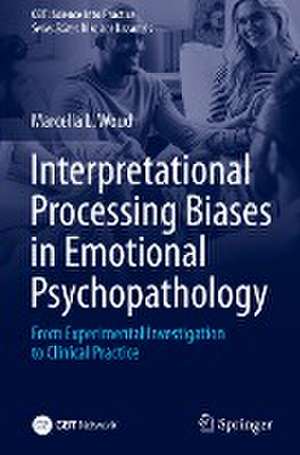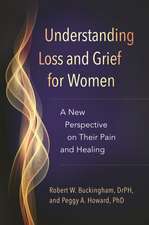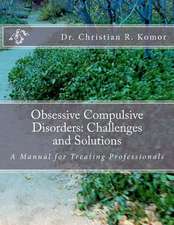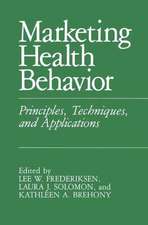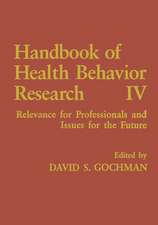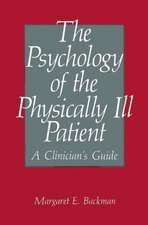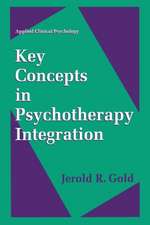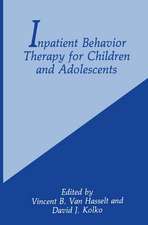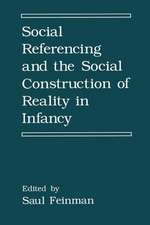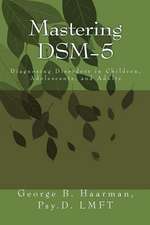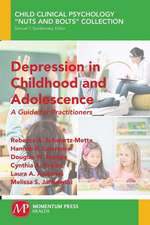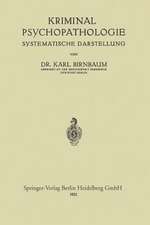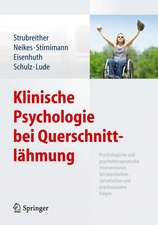Interpretational Processing Biases in Emotional Psychopathology: From Experimental Investigation to Clinical Practice: CBT: Science Into Practice
Editat de Marcella L. Wouden Limba Engleză Hardback – 29 mar 2023
From the foreword by Nikolaos Kazantzis:
"The practice of CBT is complex and requires a tailored approach. Every technique has a specific target but may be used for multiple purposes simultaneously in support of the client’s therapeutic goals. The purpose of Dr. Woud’s book is to elucidate the ways in which interpretational biases can be a focus of intervention for CBT therapists at all stages of professional development, from those undertaking training to master clinicians. Dr. Woud has succeeded admirably in this regard."
Preț: 1294.30 lei
Preț vechi: 1362.43 lei
-5% Nou
Puncte Express: 1941
Preț estimativ în valută:
247.66€ • 259.27$ • 204.93£
247.66€ • 259.27$ • 204.93£
Carte tipărită la comandă
Livrare economică 07-21 aprilie
Preluare comenzi: 021 569.72.76
Specificații
ISBN-13: 9783031236495
ISBN-10: 3031236491
Pagini: 346
Ilustrații: XVIII, 346 p. 38 illus., 23 illus. in color.
Dimensiuni: 155 x 235 mm
Greutate: 0.69 kg
Ediția:2023
Editura: Springer International Publishing
Colecția Springer
Seria CBT: Science Into Practice
Locul publicării:Cham, Switzerland
ISBN-10: 3031236491
Pagini: 346
Ilustrații: XVIII, 346 p. 38 illus., 23 illus. in color.
Dimensiuni: 155 x 235 mm
Greutate: 0.69 kg
Ediția:2023
Editura: Springer International Publishing
Colecția Springer
Seria CBT: Science Into Practice
Locul publicării:Cham, Switzerland
Cuprins
Part 1.Mehcanisms.- Chapter 1. A commentary: Why we need to understand mechanisms.- Chapter 2. Systematic steps for the scientist – practioner route to foster evidence-based treatments.- Chapter 3. Cognitive, interpretational predictors of both emotional psychopathology and therapy outcome.- Chapter 4. Interactions between interpretational and other cognitive biases.- Chapter 5. Physiological and neural correlates of interpretational biases in emotional psychopathology.- Chapter 6. Boosting functional, interpretational learning processes in psychotherapy via pharmacological agents.- Chapter 7. Mental imagery as a tool to change interpretational processing biases.- Chapter 8. The role Cognitive Bias Modification to change interpretational processing biases.- Chapter 9. The role of prediction error as a mechanism in exposure.- Part II. Clinical presentation and treatment across different emotional disorders.- Chapter 10. From theory to application: A brief history of cognitive restructuring.- Chapter 11. Depressive disorders.- Chapter 12. Phobic disorders.- Chapter 13. Generalized Anxiety Disorder.- Chapter 14. Panic disorder.- Chapter 15. Obsessive Compulsive Disorder.- Chapter 16. Post-traumatic stress disorder.
Notă biografică
Dr. Marcella L. Woud studied psychology (‘Master of Sciences’, 2008) and completed her PhD at Radboud University Nijmegen, The Netherlands (‘cum laude’, i.e., the highest possible distinction for a Ph.D in the Netherlands, which is awarded in 5% across all disciplines). During her studies and PhD, she worked and visited a number of international labs at e.g., University of Oxford and Harvard University. In November 2013, she joined the team of Dr. Margraf at Ruhr-Universität Bochum (RUB) in Germany as a Postdoctoral Researcher. Parallel to her Postdoc, she started the clinical training to become a licensed psychotherapist (with a focus on Cognitive Behavioural Therapy), completing this training in April 2020. During her research career so far, Dr. Woud has received a number of awards and prizes. For example, during her PhD, she won the Elisabeth Frye Stipendium, which is awarded to the most talented and promising female PhD students. In 2018, the Association for Psychological Science (APS) selected her as a Rising Star. This is an award to outstanding scientists in the earliest stages of their career whose innovative work has already advanced the field and signals great potential for their continued contributions. The research of Dr. Woud is supported by a number of prestigious grants. In 2020, the German Research Foundation (Deutsche Forschungsgemeinschaft, DFG) awarded her an Emmy Noether grant, which provides exceptionally qualified early career researchers the opportunity to lead an independent junior research group for a period of six years. Dr. Woud is also a Principal Investigator in a DFG-funded Collaborative Research Centre at RUB.
Dr. Woud’s work focusses on bridging experimental investigation and clinical translation in the context of anxiety disorders, such as Posttraumatic Stress Disorder, Panic Disorder, and Social Anxiety Disorder, as well as in Depression. She has a specific interest in the role of cognitive biases, e.g., dysfunctional appraisals, associations, and interpretations, and their role as a correlate, predictor, and causal risk factors in the context of emotional psychopathology. Further, her research addresses the mechanisms underlying these biases including their psychophysiological and neuronal correlates.
Dr. Woud’s work focusses on bridging experimental investigation and clinical translation in the context of anxiety disorders, such as Posttraumatic Stress Disorder, Panic Disorder, and Social Anxiety Disorder, as well as in Depression. She has a specific interest in the role of cognitive biases, e.g., dysfunctional appraisals, associations, and interpretations, and their role as a correlate, predictor, and causal risk factors in the context of emotional psychopathology. Further, her research addresses the mechanisms underlying these biases including their psychophysiological and neuronal correlates.
Textul de pe ultima copertă
The primary aim of this book is to bridge the gap between lab-based and clinical research by disseminating the latest interdisciplinary scientific findings on interpretational processing biases in the context of emotional psychopathology. It is designed to help the practitioner by drawing explicit links between the basic science and implications for clinical practice. This enables an enhanced interaction between science and practice, strengthening bi-directional translational links, and the potential to produce more meaningful and significant advances in the treatment of emotional psychopathology. This in turn will facilitate an innovative step-change in the area of both research and clinical practice. The book focuses on cognitive processing biases that are common across a wide range of psychological disorders, meaning that the conclusions drawn have relevance across the whole spectrum of psychopathology and will stimulate and inspire a broad range of discussions and future work.
From the foreword by Nikolaos Kazantzis:
"The practice of CBT is complex and requires a tailored approach. Every technique has a specific target but may be used for multiple purposes simultaneously in support of the client’s therapeutic goals. The purpose of Dr. Woud’s book is to elucidate the ways in which interpretational biases can be a focus of intervention for CBT therapists at all stages of professional development, from those undertaking training to master clinicians. Dr. Woud has succeeded admirably in this regard."
From the foreword by Nikolaos Kazantzis:
"The practice of CBT is complex and requires a tailored approach. Every technique has a specific target but may be used for multiple purposes simultaneously in support of the client’s therapeutic goals. The purpose of Dr. Woud’s book is to elucidate the ways in which interpretational biases can be a focus of intervention for CBT therapists at all stages of professional development, from those undertaking training to master clinicians. Dr. Woud has succeeded admirably in this regard."
Caracteristici
Evaluates and summarises the latest research Bridges the gap between lab-based and clinical research Applicable to various areas of psychopathology and discussions in clinical research and practice
